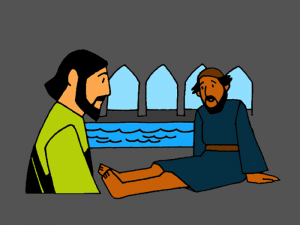John 5. 28-47

‘A single witness shall not suffice against a person for any crime or for any wrong in connection with any offense that he has committed. Only on the evidence of two witnesses or of three witnesses shall a charge be established.’ Deuteronomy 19.15
In the record at the end of John 5 Jesus applies the principle in Mosaic law of accusations being supported by two or three witnesses. Jesus uses it again in Mathew 18.16 when teaching about how to settle disputes between his followers and Paul also does so in 2 Corinthians 13.1 when he warns them about his coming to settle disputes. ‘This is the third time I am coming to you. Every charge must be established by the evidence of two or three witnesses.’ The Jewish leaders accuse Jesus in the name of Moses and Jesus turns it back on them. ‘There is one who accuses you: Moses, on whom you have set your hope. For if you believed Moses, you would have believed me; for he wrote of me. But if you do not believe his writings, how will you believe my words.’ John 5.45-47
On the question of belief, a misunderstanding can occur when Jesus was claiming he has the authority to execute judgement on the final day as the dead are raised. ‘And he (the Father) has given him (Jesus) authority to execute judgement, because he is the Son of Man. Do not marvel at this, for an hour is coming when all who are in the tombs will hear his voice and come out, those who have done good to the resurrection of life, and those who have done evil to the resurrection of Judgement.’ John 5.27-29
This passage in isolation can be read as salvation or justification by works, that is on balance one is saved if one generally lived a good life. However, previously in verse 24 Jesus said, ‘Whoever does not honour the Son does not honour the Father who sent him. Truly, truly I say to you, whoever hears my word and believes him who sent me has eternal life.’ The “good” then is belief in Jesus as the one sent by the Father and obedience to him. Evil is the rejection of Jesus.
Jesus turns the subject to who are the witnesses that testify that he is the “Son of God”. John 5.25 He turns initially to the testimony of John the Baptist who at this point is still alive and greatly respected, even feared, as a contemporary prophet and hero of the masses, if not liked or welcomed in the circles of Jewish leadership. John had publicly endorsed Jesus as the Messiah. John3.22-36 (The famous, “He must increase, but I must decrease” speech.) We see something at this point that is easily overlooked, Jesus remains concerned for the salvation of his accusers even though they are plotting to take his life. The consistency of Jesus’ underserved love continues even as he is dying and prays for the forgiveness of the soldiers who are hammering nails through his flesh and bones. Jesus referred to John’s testimony because the Jewish leaders had been, ‘willing to rejoice for a while in his light.’ John 5.35 For that reason then, they may have been willing to believe in him.
Jesus does not need the testimony of John or any other person. The works of the Father that he accomplishes are testimony in themselves. The miracles of mercy he has performed including the healing of the man at Bethesda and the royal official’s son along with many others were all works of the Father, done in the open for all to see. Jesus calls upon the word of God as a third witness. ‘The Father who sent me has himself borne witness about me. His voice you have never heard, his form you have never seen, and you do not have his word abiding in you, for you do not believe the one whom he has sent.’ John 5.37,38 When Jesus spoke of the Father’s voice it is possible he was making reference to the words God the Father spoke at his baptism by John, ‘This is my beloved Son, with whom I am well pleased.’ Mathew 3.17 but he is certainly referring to the whole of the Old Testament scriptures through which the Jewish Leaders accepted that God had spoken. Jesus is making the claim that all scripture points to him.
What the Jewish leaders found difficult to understand and accept was that studying scripture was not intrinsically life giving but that it pointed to Jesus who is. ‘It is they that bear witness about me, yet you refuse to come to me that you may have life.’ John 5.40
Finally, Jesus identifies the obstacle that prevents the Jewish leaders from recognising Jesus for who he is. It is their own pride. They want their own expertise as teachers of the law to bring them praise and credit whilst at the same time not realising that the law itself points to Jesus. John 5. 45,46 Jesus spoke plainly when he said, ‘How can you believe, when you receive glory from one another and do not seek the glory that comes from the only God.’ John 5.44 Their pride had become their idol. As we read the bible do we ask the Spirit to reveal to us in what ways it reveals Jesus?What things do we place in our life before seeking the glory that comes from God?What is the evidence we are confident of, that Jesus is the Christ?
Who Is There Like You? – Paul Oakley




